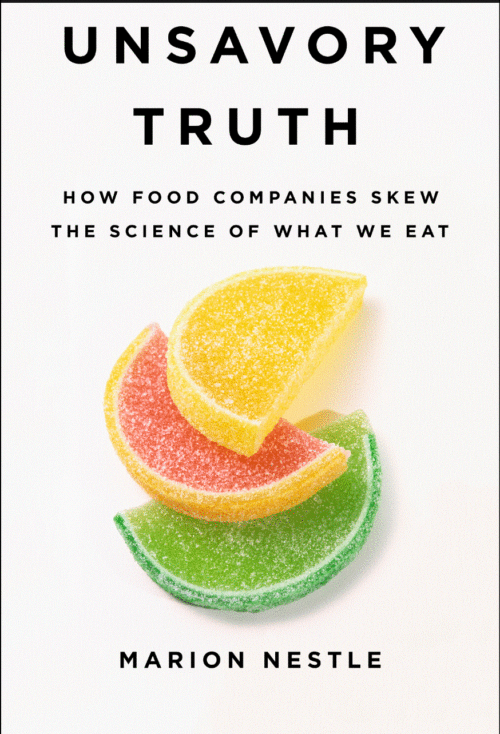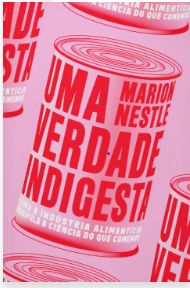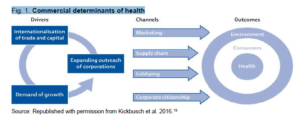
For review copies, interviews, etc, contact Kelsey Odorczyk at Basic Books: Kelsey.Odorczyk@hbgusa.com
For information about the book, see Basic Books/Hachette, IndieBound, Amazon
For reviews and media accounts, scroll down.
Portuguese translation, Elefante Editora, 2019:

Summary
Is chocolate heart-healthy? Does yogurt prevent type 2 diabetes? Do pomegranates help cheat death? News headlines bombard us with such amazing claims. They are reported as science, and have dramatic effects on what we eat. Yet, as food expert Marion Nestle explains, these studies are more about marketing than science; they are often paid for by the companies and trade associations that sell those foods. Whether it’s a Coca-Cola-backed study hailing light exercise as a calorie neutralizer, claims for beef as a health food, or a report from investigators paid by a blueberry trade group concluding that this fruit prevents erectile dysfunction, every corner of the food industry knows how to turn conflicted research into big profit. As Nestle argues, it’s time to put public health first. Written with unmatched rigor and insight, Unsavory Truth reveals how the food industry manipulates nutrition science—and suggests what we can do about it.
Blurbs
“What happens when one of the country’s great nutrition investigators follows the money in food and science? You get this riveting, provocatively-written book, which deftly explores how the processed food industry has deepened our dependence on its products by sponsoring and manipulating food research for decades. This book should be read by anyone who has been seduced by the words, ‘New study shows…’—which is all of us.” —Michael Moss, author of Salt Sugar Fat
“Marion Nestle is a tireless warrior for public health, and her meticulous research and irrefutable arguments are desperately needed right now. This book, as frightening as it is, compels us to discover where true health begins: nutrition starts in the ground, with real food that is sustainably grown, eaten in season, and alive.” —Alice Waters, founder, owner, and executive chef of Chez Panisse
“In clear, concise language, Marion Nestle details the many ways our ideas about what to eat are being manipulated by Big Food. If you want to make better choices, read this book.” —Ruth Reichl, former editor of Gourmet Magazine
“Marion Nestle is a national treasure. She has the courage to take on multinational corporations and the wisdom to separate the facts from the spin. If you care about our food system and the health of your family, Unsavory Truth is essential reading.” —Eric Schlosser, author of Fast Food Nation
“Marion Nestle has been a guiding light for sanity, credibility, and justice in food and nutrition for decades; she stands alone in her field. In Unsavory Truth, she exposes the awful deceptions practiced on eaters by manipulative food companies using ‘scientific research’ try to make themselves look good.” —Mark Bittman, author of How to Cook Everything
“Marion Nestle is a truth-teller in a world awash with nutrition lies of one kind and another. In this scintillating and eye-opening book, Nestle reveals how much of our confusion about food in modern times has been spread by the food industry itself, which passes off marketing as science and funds ‘research’ designed to show that its products are harmless. Unsavory Truth is essential reading for anyone in search of hard facts about what to eat.” —Bee Wilson, author of First Bite and Consider the Fork
Reviews and media
2021
July 7 SPINS: What We’re Reading
2020
June 15 Aym Playing: Many Audiences Could Benefit from Reading Marion Nestle’s “Unsavory Truth”
2019
June 6 Review in American Journal of Public Health 2019;109(7):952-953.
Mar 11 Interview with VegSource with Jeff Nelson
Mar 5 TVO (Canada) The Agenda with Steve Paikin: Battling bias in nutrition research. Also on YouTube.
Feb 17 Cover story based on Unsavory Truth, San Francisco Chronicle: “The myth-making of food”
Feb 5 KQED San Francisco, Michael Krasny’s Forum
Feb 2 Sarah Boseley reviews Unsavory Truth in The Lancet
Jan/Feb Nutrition Action Healthletter: Peter Lurie’s editorial
Jan 25 Interview with Holly Friend of LS:N Global
Jan 22 KPFK radio interview , Feminist Magazine with Lynn Harris Ballen
Jan 21 Cookery by the Book, podcast with Suzy Chase
Jan 16 Kara Goldin’s podcast on Unstoppable, Unsavory Truth
2018
Dec 21 The Hagstrom Report’s five best ag books of 2018
Dec 19 Podcast with Max Lugavere, The Genius Life Episode 39 (iTunes), on Unsavory Truth
Dec 17 Radio interview with Rose Aguilar, KALW San Francisco on Unsavory Truth
Dec 14 Podcast review by Narsai David, KCBS
Dec 13 Lecture on Unsavory Truth (video) at Hunter College NYC Food Policy Center
Dec 13 Online interview at PLoS Blog
Dec 12 Podcast with Wooden Teeth
Dec 6 NYU Journalism Kavli Conversation on Science Communication with Paul Greenberg, moderated by Robert Lee Hotz
Dec 3 Interview (podcast) with Bhavani Jaroff of iEat Green
Nov 30 Conor Purcell interview for Undark’s Five Questions
Nov 29 Paul Thacker on Unsavory Truth in the BMJ
Nov 28 Podcast interview with Monica Eng on Unsavory Truth: Chewing episode 55
Nov 26 Lisa Held on Unsavory Truth, Edible Manhattan
Nov 19 Interview with Gabrielle Lipton, Landscape News
Nov 18 Video of interview with Dean Malcolm Clemens, Forum at Grace Cathedral, San Francisco (audio file).
Nov 15 Review by Gavin Wren, Medium.com
Nov 15 Video of keynote at launch of UCSF Food Industry Documents Library (my talk is in Part I: 14:30)
Nov 12 Jennifer Bowden on Unsavory Truth in New Zealand’s The Listener.
Nov 12 Interview with Jesse Mulligan, Radio New Zealand
Nov 10 Review in New Scientist
Nov 7 Podcast interview with The Potter Report
Nov 7 A. Pawlowski. What are superfoods? The truth about blueberries, dark chocolate and pomegranate. Today.
Nov 6 Interview with Paul Thacker. Tonic.
Nov 4 Lorin Fries. Who decides what you eat? (Hint: it’s not only you). Forbes.
Nov 1 Review in New York Journal of Books
Oct 31 Review from New York Magazine’s The Cut
Oct 31 Interview with Julia Belluz in Vox
Oct 30 Excerpt from Unsavory Truth on Medium.com: “When Big Soda Started Stalking Me”
Oct 30 NPR radio interview with Brian Lehrer
Oct 30 Yoni Freedhoff, Weighty Matters.
Oct 30 Jane Brody. Confused by nutrition research? New York Times, Science section.
Oct 29 RT America video interview on Boom Bust about Unsavory Truth.
Oct 28 Hailey Eber. How the food industry fooled us into eating junk. New York Post, 42-43.
Oct 23 Nestle M. Superfoods are a marketing ploy (excerpt). The Atlantic .
Oct 22 Àlex Pérez. Una verdad desagradable no vende. ElPiscolabis (Spain).
Oct 18 Nature Magazine (2018;562:334-335): Felicity Lawrence reviews Deborah Blum’s The Poison Squad and Unsavory Truth as “Poisoned Platefuls.” “Nestle…could make a fair claim to [Harvey] Wiley’s mantle today…The book is a remorseless dissection of the corruption of science by industry.”
Oct 18 Interview with Maggie Tauranac on Unsavory Truth, FoodPrint
Oct 16 Podcast with Danielle Nierenberg on Unsavory Truth and other matters
Oct 2 Science Magazine: “There is indeed something rotten in the state of dietary science, but books like this show us that we consumers also hold a great deal of power.”
Sept 25 La Stampa (Italy): “I cibi di lunga vita sono illusori e troppi sponsor li promuovono.” (The newspaper clip).
Sept 24 Publishers Weekly: ” a groundbreaking look at how food corporations influence nutrition research and public policy.”
Aug 13 Booklist: “This well-documented, accessible venture makes a compelling argument.”
Aug 1 Kirkus: “Nestle proves yet again that she is a unique, valuable voice for engaged food consumers.”
July 17 Phil Lempert’s Lempert Report: Get ready for a new era of transparency (video)
July 9 David Wineberg, “Nutrition: conflict of interest as a career,” Medium.com.
Feb 12 Finnish Public Radio interview about Unsavory Truth (Google Translate, English)
Jan 31 Profile in New Scientist: The Unpalatable Truth about Your Favorite foods
Tweets (Highly Selected)
Michael Pollan, October 30
Ing Fei Chen, October 16: Undark
Yoni Freedhoff, October 7: his mentions
Basic Books, October 2: Mark Bittman blurb
Basic Books, September 25: Ruth Reichl blurb
Basic Books, September 6: Eric Schlosser blurb
Basic Books, August 28: Alice Waters blurb
Michael Pollan, August 18: “This is a terrific and eye-opening book”
Bee Wilson, August 17: “I feel lucky to have an advance copy …A great piece of investigative writing.”
Basic Books, August 17: Bee Wilson blurb





